-
 Bitcoin
Bitcoin $108,270.9768
2.07% -
 Ethereum
Ethereum $2,489.8066
2.50% -
 Tether USDt
Tether USDt $1.0004
0.01% -
 XRP
XRP $2.2035
0.66% -
 BNB
BNB $661.6608
2.32% -
 Solana
Solana $150.6425
2.13% -
 USDC
USDC $0.9999
-0.01% -
 TRON
TRON $0.2810
0.90% -
 Dogecoin
Dogecoin $0.1645
3.05% -
 Cardano
Cardano $0.5743
4.91% -
 Hyperliquid
Hyperliquid $38.8419
-0.15% -
 Bitcoin Cash
Bitcoin Cash $504.3134
-2.64% -
 Sui
Sui $2.8096
4.35% -
 Chainlink
Chainlink $13.3095
2.21% -
 UNUS SED LEO
UNUS SED LEO $8.9469
0.33% -
 Avalanche
Avalanche $17.9231
3.93% -
 Stellar
Stellar $0.2340
0.74% -
 Toncoin
Toncoin $2.8458
3.21% -
 Shiba Inu
Shiba Inu $0.0...01158
3.47% -
 Litecoin
Litecoin $86.0738
1.94% -
 Hedera
Hedera $0.1507
2.99% -
 Monero
Monero $319.8544
2.31% -
 Polkadot
Polkadot $3.4081
1.95% -
 Dai
Dai $1.0000
0.01% -
 Bitget Token
Bitget Token $4.5645
0.91% -
 Ethena USDe
Ethena USDe $1.0002
0.00% -
 Uniswap
Uniswap $7.2959
5.27% -
 Aave
Aave $272.4623
2.90% -
 Pepe
Pepe $0.0...09680
2.96% -
 Pi
Pi $0.4955
0.78%
What are the risks of Ethereum wallet theft?
Ethereum wallet theft risks include private key compromise via phishing, malware, or exchange hacks; software vulnerabilities; hardware wallet malfunctions; and social engineering. Protecting your private keys is paramount.
Mar 15, 2025 at 11:16 pm
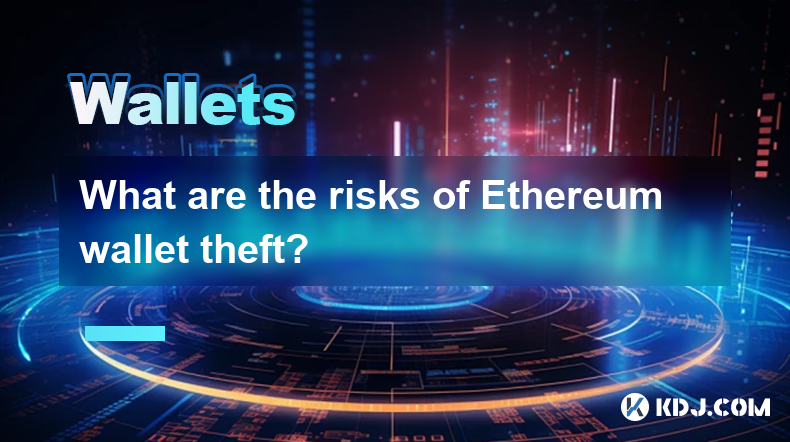
Key Points:
- Private Key Compromise: The most significant risk is the loss or theft of your private key, granting unauthorized access to your funds.
- Phishing Scams: Deceptive emails, websites, and messages trick users into revealing their private keys or seed phrases.
- Malware and Viruses: Malicious software can steal your private keys or monitor your transactions.
- Exchange Hacks: If you store ETH on an exchange, you're vulnerable to hacks and security breaches targeting the platform itself.
- Software Vulnerabilities: Bugs in wallet software can create security loopholes exploited by attackers.
- Hardware Wallet Malfunctions: Though safer, hardware wallets can malfunction, leading to data loss.
- Social Engineering: Manipulative tactics exploit trust to gain access to your wallet information.
What are the risks of Ethereum wallet theft?
Ethereum wallet theft presents a significant risk to users holding ETH and other ERC-20 tokens. The primary concern revolves around the security of your private keys, which are essentially the passwords to your cryptocurrency. Losing or having these compromised grants complete control of your funds to malicious actors. There are several pathways through which this compromise can occur.
One major risk is private key compromise. This happens when your private keys are stolen, whether through phishing, malware, or physical theft of a hardware wallet. Without your private keys, you cannot access or manage your Ethereum assets. This is the most critical risk, and proper security measures are paramount to prevent it.
Phishing scams are incredibly prevalent in the cryptocurrency space. These scams often involve deceptive emails, websites, or messages that appear legitimate. They trick users into revealing their private keys or seed phrases under false pretenses, often involving fake giveaways or urgent security alerts. Always verify the authenticity of any communication before providing sensitive information.
Malware and viruses pose a serious threat. These malicious programs can install keyloggers that record your keystrokes, including your private keys. They can also monitor your transactions and steal your funds directly. Employing reputable antivirus software and being cautious about downloaded files are crucial preventative measures.
Storing your Ethereum on exchanges introduces another layer of risk. While convenient, exchanges are centralized entities, making them targets for hackers. High-profile exchange hacks have resulted in significant losses for users. Consider the security track record of any exchange before entrusting it with your funds.
Software vulnerabilities in wallet software can also be exploited. Bugs in the code can create security loopholes that attackers can leverage to gain unauthorized access. Using well-established, regularly updated wallets from reputable developers helps mitigate this risk. Always be sure to check for updates and only download software from trusted sources.
While considered more secure, even hardware wallets aren't immune to risk. These physical devices can malfunction, potentially leading to data loss or inaccessibility to your funds. Although rare, this possibility underscores the importance of regularly backing up your recovery phrase and storing it securely offline.
Social engineering attacks leverage human psychology to trick users into divulging sensitive information. This can involve manipulating individuals through trust, urgency, or fear. Maintaining a healthy skepticism and avoiding interactions that feel suspicious are crucial to mitigating this type of risk.
Common Questions and Answers:
Q: What is a private key, and why is it so important?
A: Your private key is a secret cryptographic code that proves your ownership of your Ethereum wallet. Without it, you cannot access or spend your ETH. It's crucial to protect it meticulously.
Q: What is a seed phrase, and how does it relate to my private keys?
A: A seed phrase (or mnemonic phrase) is a list of words that acts as a backup for your private keys. If you lose access to your wallet, your seed phrase allows you to recover it. Keep it secure and offline.
Q: How can I protect myself from phishing scams?
A: Always verify the legitimacy of any email or website before entering sensitive information. Check URLs carefully, look for security certificates (HTTPS), and never click links from unknown senders.
Q: What are the best practices for securing my Ethereum wallet?
A: Use strong, unique passwords, enable two-factor authentication (2FA) where available, keep your software updated, use reputable wallets, and regularly back up your seed phrase.
Q: Are hardware wallets completely safe?
A: Hardware wallets are significantly more secure than software wallets, but they are not entirely invulnerable. They can be lost, stolen, or malfunction. Properly securing your device and backing up your seed phrase are essential.
Q: What should I do if I suspect my wallet has been compromised?
A: Immediately change your passwords, contact your exchange (if applicable), and report the incident to the relevant authorities. Monitor your transactions closely and take steps to secure any remaining assets.
Q: What is the role of insurance in protecting against Ethereum wallet theft?
A: Currently, comprehensive insurance specifically covering cryptocurrency theft is still developing. Some exchanges offer limited insurance, but it's not universally available. Robust security practices remain the primary defense.
Disclaimer:info@kdj.com
The information provided is not trading advice. kdj.com does not assume any responsibility for any investments made based on the information provided in this article. Cryptocurrencies are highly volatile and it is highly recommended that you invest with caution after thorough research!
If you believe that the content used on this website infringes your copyright, please contact us immediately (info@kdj.com) and we will delete it promptly.
- XRP Price Targets $2.40 After Descending Channel Breakout: Is $40 Next?
- 2025-07-03 08:50:12
- All Blacks' Loose Forward Conundrum: New Faces and Familiar Battles
- 2025-07-03 08:30:12
- Bitcoin's Wild Ride: Open Interest, Institutional Bets, and Billions on the Line
- 2025-07-03 08:30:12
- Bitcoin, Strategy, & Profit: MSTR's Crypto Playbook and Trump's Digital Diversification
- 2025-07-03 08:50:12
- Bitcoin on the Brink: Active Supply Signals Potential Rally
- 2025-07-03 06:30:12
- Solana, XRP, SEI: Altcoin Titans and the Next Big Thing
- 2025-07-03 06:50:12
Related knowledge

Does Phantom wallet offer two-factor authentication (2FA)?
Jul 03,2025 at 09:00am
Understanding Phantom Wallet and Its Security FeaturesPhantom wallet is a widely used non-custodial cryptocurrency wallet that supports the Solana blockchain. It allows users to store, send, receive, and interact with decentralized applications (dApps) seamlessly. As security is a top priority for any crypto wallet user, security features like two-facto...

What is "rent" on Solana and how does it affect my Phantom wallet?
Jul 02,2025 at 08:35pm
Understanding 'Rent' on SolanaIn the context of Solana, the term 'rent' refers to a storage fee that users pay for maintaining data on the blockchain. Unlike Ethereum, where storage costs are paid once via gas fees during contract deployment, Solana implements a recurring cost model to ensure efficient usage of network resources. This means that any acc...
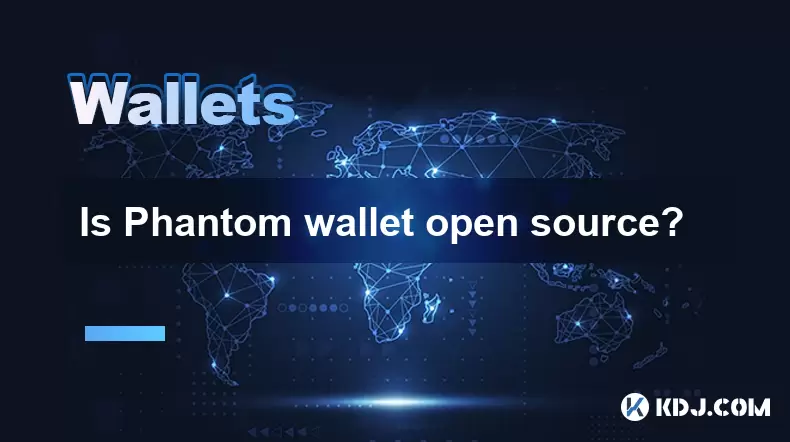
Is Phantom wallet open source?
Jul 03,2025 at 12:29am
What is Phantom Wallet?Phantom wallet is a non-custodial cryptocurrency wallet primarily designed for the Solana blockchain. It allows users to store, send, receive, and interact with decentralized applications (dApps) on the Solana network. The wallet is available as a browser extension and mobile application, offering a seamless experience for both be...
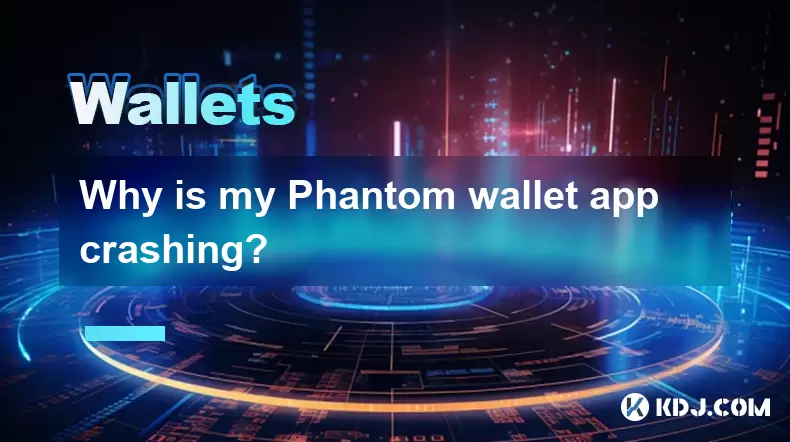
Why is my Phantom wallet app crashing?
Jul 02,2025 at 07:35pm
Understanding Phantom Wallet App CrashesIf you're experiencing issues with the Phantom wallet app crashing, you're not alone. Many users have reported similar problems, especially during high network activity or after recent updates. Phantom is a popular Solana-based wallet that allows users to store, send, and receive SOL tokens as well as interact wit...
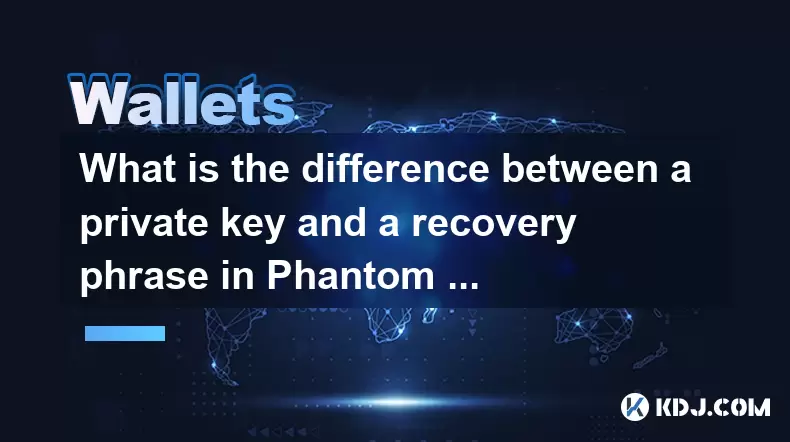
What is the difference between a private key and a recovery phrase in Phantom wallet?
Jul 02,2025 at 09:57am
Understanding the Basics of Phantom WalletPhantom wallet is a non-custodial digital wallet primarily used for interacting with the Solana blockchain. It allows users to store, send, and receive SOL tokens and other digital assets like NFTs. Non-custodial means that the user retains full control over their private keys and recovery phrases. Understanding...
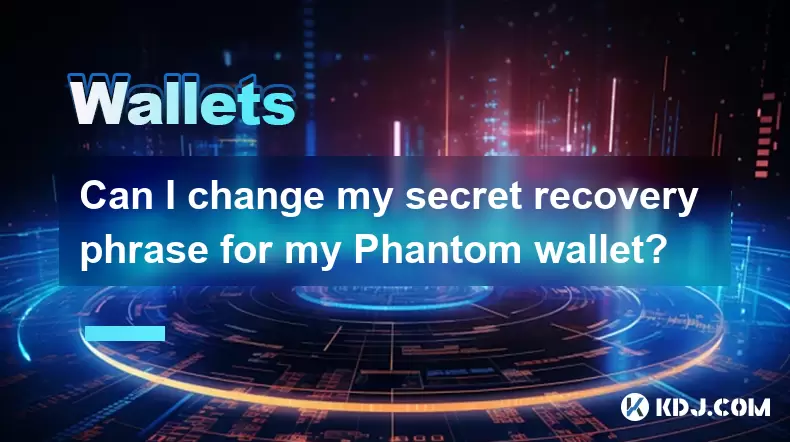
Can I change my secret recovery phrase for my Phantom wallet?
Jul 02,2025 at 12:07pm
Understanding the Role of a Secret Recovery PhraseThe secret recovery phrase, often referred to as a seed phrase, is a critical component in managing cryptocurrency wallets like Phantom. It serves as a backup mechanism that allows users to recover their wallet and associated assets if they lose access to their device or password. Typically, this phrase ...

Does Phantom wallet offer two-factor authentication (2FA)?
Jul 03,2025 at 09:00am
Understanding Phantom Wallet and Its Security FeaturesPhantom wallet is a widely used non-custodial cryptocurrency wallet that supports the Solana blockchain. It allows users to store, send, receive, and interact with decentralized applications (dApps) seamlessly. As security is a top priority for any crypto wallet user, security features like two-facto...

What is "rent" on Solana and how does it affect my Phantom wallet?
Jul 02,2025 at 08:35pm
Understanding 'Rent' on SolanaIn the context of Solana, the term 'rent' refers to a storage fee that users pay for maintaining data on the blockchain. Unlike Ethereum, where storage costs are paid once via gas fees during contract deployment, Solana implements a recurring cost model to ensure efficient usage of network resources. This means that any acc...

Is Phantom wallet open source?
Jul 03,2025 at 12:29am
What is Phantom Wallet?Phantom wallet is a non-custodial cryptocurrency wallet primarily designed for the Solana blockchain. It allows users to store, send, receive, and interact with decentralized applications (dApps) on the Solana network. The wallet is available as a browser extension and mobile application, offering a seamless experience for both be...

Why is my Phantom wallet app crashing?
Jul 02,2025 at 07:35pm
Understanding Phantom Wallet App CrashesIf you're experiencing issues with the Phantom wallet app crashing, you're not alone. Many users have reported similar problems, especially during high network activity or after recent updates. Phantom is a popular Solana-based wallet that allows users to store, send, and receive SOL tokens as well as interact wit...

What is the difference between a private key and a recovery phrase in Phantom wallet?
Jul 02,2025 at 09:57am
Understanding the Basics of Phantom WalletPhantom wallet is a non-custodial digital wallet primarily used for interacting with the Solana blockchain. It allows users to store, send, and receive SOL tokens and other digital assets like NFTs. Non-custodial means that the user retains full control over their private keys and recovery phrases. Understanding...

Can I change my secret recovery phrase for my Phantom wallet?
Jul 02,2025 at 12:07pm
Understanding the Role of a Secret Recovery PhraseThe secret recovery phrase, often referred to as a seed phrase, is a critical component in managing cryptocurrency wallets like Phantom. It serves as a backup mechanism that allows users to recover their wallet and associated assets if they lose access to their device or password. Typically, this phrase ...
See all articles

























































































